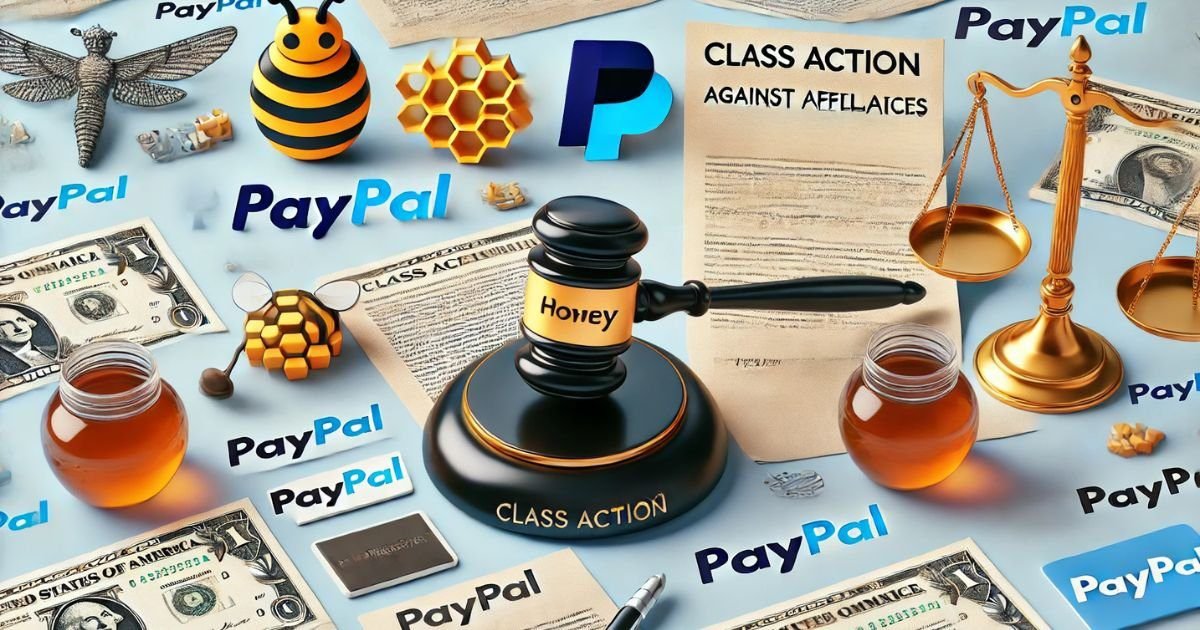The Honey and PayPal Class Action Lawsuit has garnered significant attention, highlighting serious concerns about affiliate marketing practices. This lawsuit revolves around the allegations that PayPal’s Honey browser extension misdirects affiliate commissions, diverting revenue that should go to content creators. Influencers, bloggers, and YouTubers have claimed that Honey swaps their affiliate links with its own, resulting in the loss of commissions from sales they helped generate.
The case is pivotal, not only for those directly involved but also for the broader affiliate marketing industry, as it raises questions about transparency, consent, and fairness in digital commerce. The outcome of this case could redefine how affiliate programs and browser extensions operate moving forward, potentially impacting creators and businesses alike.
Understanding Honey and PayPal’s Business Model
- Honey’s Role in Affiliate Marketing:
Honey is a browser extension that helps users find and apply discount codes automatically during online shopping.
It also operates as an affiliate marketing tool by redirecting users through its own affiliate links, earning a commission from purchases.
- PayPal’s Acquisition of Honey:
In 2020, PayPal acquired Honey for $4 billion, adding it to their portfolio of digital tools to enhance e-commerce and online shopping experiences.
The acquisition allowed PayPal to expand its reach into affiliate marketing and the coupon industry.
- Affiliate Link Management:
Honey’s business model revolves around using affiliate links that replace original links shared by content creators.
These affiliate links earn Honey commissions on sales made through the platform, often bypassing content creators who would normally earn these commissions.
The Allegations: What Led to the Class Action Lawsuit?
Affiliate Link Manipulation
The primary allegation in the Honey and PayPal Class Action Lawsuit is that Honey manipulates affiliate links. Content creators, including bloggers and YouTubers, claim that Honey overrides their affiliate links with its own, rerouting commissions intended for them to Honey instead. This practice is accused of depriving creators of revenue they rightfully earned through their promotional efforts.
Unjust Enrichment and Lack of Consent
Plaintiffs argue that Honey’s actions amount to unjust enrichment, where PayPal and Honey benefit from commissions that should go to the original content creators. Additionally, the lawsuit highlights that Honey performs these actions without the consent or knowledge of the creators, which critics see as deceptive and unethical.
Violation of Consumer Protection Laws
The case also claims that Honey’s behavior violates consumer protection laws, particularly in California, which has strong regulations against unfair business practices.
Must Read : Bebezomzom: Guide to Best Baby Monitors for a Peaceful Home
The Key Players in Honey and PayPal Class Action Lawsuit
The Honey and PayPal Class Action Lawsuit involves several key plaintiffs and defendants:
Plaintiffs
- Claudia Jayne Young: An Instagram content creator who alleges that Honey’s browser extension diverted affiliate commissions from her sales. She filed a class action lawsuit in the U.S. District Court for the Northern District of California, requesting compensation and court orders to stop the alleged practices.
- Wendover Productions LLC: A YouTube channel with over 4.7 million subscribers, alleging that Honey replaced its affiliate links with its own, depriving the channel of rightful commissions.
- Businessing LLC: Associated with content creator Ali Spagnola, this company claims Honey’s actions led to the loss of affiliate commissions
- GamersNexus LLC: A technology review outlet that joined the lawsuit, accusing PayPal of converting affiliate commissions through Honey’s practices.
Defendants
- PayPal Inc.: The parent company of Honey, accused of enabling Honey’s practices that allegedly diverted affiliate commissions from content creators.
- Honey Science LLC: A subsidiary of PayPal, responsible for the Honey browser extension, which is central to the allegations in the lawsuit.
These parties are engaged in a legal battle over the fairness and transparency of affiliate marketing practices in the digital age.
What Are the Legal Claims in the Honey and PayPal Class Action Lawsuit?
The Honey and PayPal Class Action Lawsuit raises several legal claims centered on Honey’s affiliate marketing practices:
- Conversion: Plaintiffs allege that PayPal and Honey unlawfully diverted affiliate commissions by replacing original affiliate links with their own, thereby claiming commissions for sales they did not originate.
- Tortious Interference with Contractual Relations: The lawsuit contends that Honey’s actions disrupted existing business relationships between content creators and merchants by redirecting commissions, thus interfering with contractual agreements.
- Violation of California’s Unfair Competition Law: Plaintiffs claim that Honey’s practices constitute unfair business practices under California law, as they allegedly mislead consumers and harm competitors.
- Unjust Enrichment: The lawsuit argues that PayPal and Honey were unjustly enriched by retaining commissions that rightfully belonged to content creators, without providing equivalent value in return.
These claims collectively seek damages and injunctive relief to prevent further alleged misconduct by Honey.
The Industry Implications of the Honey and PayPal Class Action Lawsuit
The Honey and PayPal Class Action Lawsuit could have significant implications for the broader affiliate marketing industry. If the lawsuit is successful, it may force a reevaluation of how browser extensions like Honey operate within the affiliate marketing ecosystem. The case raises concerns about transparency, as it questions whether consumers and content creators fully understand how their affiliate links are being handled. This could lead to stricter regulations on affiliate link management, ensuring that content creators are compensated fairly and that consumers are not unknowingly diverted to affiliate links. Furthermore, it could prompt tech companies and e-commerce platforms to adopt clearer disclosure policies.
For affiliate marketers, the lawsuit highlights the importance of maintaining control over affiliate links and understanding the potential risks of relying on third-party tools. The outcome could reshape affiliate marketing practices and influence future legal frameworks in digital commerce.
The Current Status of Honey and PayPal Class Action Lawsuit
As of April 2025, the Honey and PayPal Class Action Lawsuit is actively progressing through the legal system. Multiple class action lawsuits have been filed against PayPal and its subsidiary, Honey, alleging that Honey’s browser extension improperly diverts affiliate commissions from content creators. The complaints claim that Honey replaces creators’ affiliate tracking cookies with its own during checkout, redirecting commissions without consent. These lawsuits seek damages and injunctions to halt the alleged practices. In response to these allegations, PayPal maintains that Honey’s actions align with industry standards, specifically last-click attribution. However, critics argue that Honey’s practices exceed conventional norms by overriding affiliate links without user consent.
The controversy has led to significant user attrition for Honey, with reports indicating a loss of approximately 3 million users within two weeks of the allegations surfacing.
Legislative and platform responses are unfolding, with entities like Google updating policies to address concerns related to affiliate commission practices.
The outcomes of these legal proceedings and policy changes are pending, with potential implications for affiliate marketing practices and the operations of browser extensions in the digital commerce landscape.
(FAQ) About the Honey and PayPal Class Action Lawsuit
1. What is the Honey and PayPal Class Action Lawsuit about?
Honey and PayPal Class Action Lawsuit claims that PayPal’s Honey browser extension diverts affiliate commissions intended for content creators by replacing their affiliate links with its own. This action allegedly deprives creators of revenue they earned through referrals, leading to accusations of unjust enrichment and unfair business practices.
2. Who are the plaintiffs in the Honey and PayPal Class Action Lawsuit?
The plaintiffs include individual content creators and companies, such as YouTubers and Instagram influencers, who claim Honey’s actions cost them affiliate commissions. Notable plaintiffs include Devin Stone (LegalEagle) and Claudia Jayne Young.
3. What legal claims are being made in the lawsuit?
The lawsuit raises several claims, including conversion (theft of commissions), tortious interference with contracts, violation of California’s Unfair Competition Law, and unjust enrichment, where Honey allegedly benefited without compensating creators.
4. How does PayPal defend Honey’s practices?
PayPal argues that Honey’s actions are consistent with standard industry practices, particularly last-click attribution, where the most recent referral before a purchase receives the credit for the sale. PayPal maintains that this is a widely accepted method in affiliate marketing.
5. What impact could the lawsuit have on affiliate marketing?
If the lawsuit is successful, it could lead to stricter regulations on how affiliate commissions are managed, potentially affecting how browser extensions and e-commerce platforms handle affiliate links. This may result in more transparency and fairness for content creators in digital marketing.
Conclusion: Honey and PayPal Class Action Lawsuit
The Honey and PayPal Class Action Lawsuit is a pivotal case that could reshape the future of affiliate marketing. If successful, it may prompt stricter regulations on how affiliate links are handled by browser extensions and e-commerce platforms, ensuring that content creators are fairly compensated for their efforts. The lawsuit also brings attention to the need for transparency in digital marketing practices, potentially leading to changes in consumer consent and affiliate link management.
For PayPal and Honey, the outcome could affect their business models, forcing them to adopt more ethical and transparent practices. Ultimately, this case has the potential to set a new precedent for how affiliate marketing operates, balancing the interests of creators, consumers, and tech companies. The industry may see significant changes in fairness, transparency, and accountability moving forward.
Read More : Brighton Apple Watch Band: Perfect Blend of Fashion and Function
Thanks for visiting Globalexpressinfo.com. Don’t forget to share it on Twitter.






